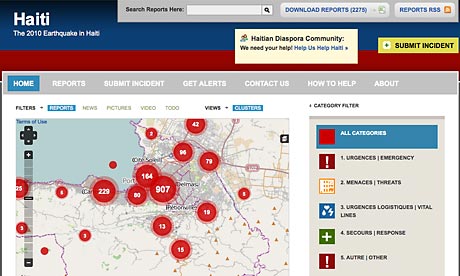Meet the Wikipedia of the mapping world
Thanks to its team of volunteers, OpenStreetMap has now mapped most of the world – including Haiti
By: Victor Keegan
From: guardian.co.uk

Haiti map on Ushahidi.com, built using OpenStreetMap data
It is the Wikipedia of the mapping world, and is used by millions of people. Started a little over five years ago in London by Steve Coast, it has steadily built up its database to the point where most of the world has now been mapped by a formidable team of volunteers which is doubling every six months: there were 212,000 at the last count, of whom 10% are active during any one month. At the end of January there were 239 people rebuilding the map of Haiti. For a bird's eye view of operations, go to the Ushahidi site.
When the earthquake happened it was a signal for OSM members around the globe to start downloading satellite images (either freely available or donated by Yahoo) and then to start tracing the outlines of streets on top so a map emerged. Volunteers on the ground in Haiti, often using Garmin GPS locators, added vital local information – such as which roads were passable, where the hospitals were situated, where refugee camps were, or walls, pharmacies, hedges and so forth – so rescue workers had an invaluable tool. The result is a new, detailed map that is updated frequently, unlike most commercial maps.
This is only one of a number of open projects operating in Haiti in what may come to be seen as a seminal moment in the harnessing of the web to help those in need. Others include CrisisCommons, WeHaveNeed, Sahana, open source medical software and numerous others, not to mention Twitter tags such as #haiti. One of the problems of using appropriate technology in disaster regions is that bricklayers in Haiti don't know of innovations that might have been pioneered in remote parts of Africa, a problem that Akvo is trying to solve with regard to water. There are also signs that Hexayurt low-cost housing projects are starting to seed in Haiti.
OpenStreetMaps is itself at a turning point as it tries to progress from a techie-driven project to one that the ordinary consumer can not only understand but contribute to as well. It suffers from what might be dubbed "open source syndrome", a complaint that also affects other OS projects including the Linux operating system – the involvement of skilled volunteers can make the early stages a bit difficult to understand for laypeople.
However, they have been working on it and it is now much easier to do. A few days ago I added my local curry house to the map (next to a post box someone else had already inserted). All I needed to do was to drag a symbol of a restaurant from the bottom of the screen to where I wanted to put it and then add the words "Indian Diner". That in a nutshell is the comparative advantage that OpenStreetMap claims over other online maps. Users can add whatever detail interests them such as cycle routes, skateboarding areas, cycle parks, paths through parks – the parts Google can't reach. You have to register (it's free) as a member to alter the map. There is an iPhone app, Mapzen, produced by Cloudmade (company founded by Coast and Nick Clark to exploit mapping opportunities) that enables you to insert places of interest you have found on the move. If that takes off, it could lift the project to a new level.
Often volunteers create maps where there was nothing before as in Kibera in Kenya where basic amenities such as drinking water sources and latrines as well as churches are located to improve living standards and combat illness (eg, where latrines are located too near water sources). The Kibera team have been asked by Ushahidi and Google to include mapping of the slums of Port-au-Prince as part of the relief effort, something that hasn't been done before.
Gordon Brown, the UK prime minister, has just rediscovered cooperativism as a way of galvanising people to vote Labour. He would have been much more in tune with the times if he had widened it to include the open source movement in all its different aspects. It is one of the most interesting phenomena of our times, a kind of global mutual society. While the likes of Apple and Amazon, though producing fantastic products, are becoming ever more controlling and proprietary, it is sobering to be reminded that one of the basic instincts of human nature – mutual cooperation for no cost – is thriving on a global scale.
Follow Vic Keegan on Twitter





0 comments:
Post a Comment